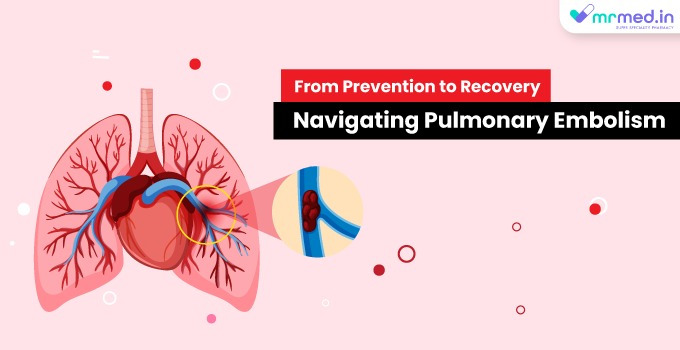Pulmonary embolism (PE) is a serious condition that occurs when a blood clot, typically originating in the legs, travels to the lungs and blocks blood flow. This can result in damage to the lungs and even be life-threatening. While prevention is key, it is also important to know how to navigate recovery if you or a loved one has experienced PE.
Prevention of Pulmonary Embolism
Prevention of PE is crucial, as it can be a difficult condition to recover from. One of the best ways to prevent PE is by maintaining a healthy lifestyle, which includes regular exercise and a balanced diet. Here is a guide to help navigate the prevention and recovery from PE,
- Staying hydrated and avoiding smoking and alcohol can also help reduce the risk of blood clots forming.
- Maintain a healthy lifestyle: Regular exercise, a balanced diet, and maintaining a healthy weight can help prevent blood clots and reduce the risk of developing PE.
- Avoid sitting for long periods: Sitting for extended periods can increase the risk of blood clots forming in the legs. Taking frequent breaks to stand up and walk around can help improve circulation.
- Compression stockings: Wearing compression stockings can help improve circulation and reduce the risk of blood clots forming in the legs.
- Medications: In some cases, your doctor may prescribe blood thinners to reduce the risk of blood clots forming.
Recognizing the Symptoms of Pulmonary Embolism
The symptoms of PE can be vague and easily confused with other conditions, such as a respiratory infection or asthma. Symptoms can include sudden shortness of breath, chest pain, coughing up blood, and rapid heartbeat.
If you experience any of these symptoms, it is important to seek medical attention immediately. Early diagnosis and treatment can greatly improve the chances of recovery.
Treating Pulmonary Embolism
Treatment for PE usually involves anticoagulants or blood-thinning medications such as Apixaban. Eliquis 5mg tablet has apixaban as an active ingredient, which helps to break up the clot and prevent new clots from forming. In some cases, surgical intervention may be necessary to remove the clot. Oxygen therapy and pain management may also be necessary to help manage symptoms.
Navigating Recovery from Pulmonary Embolism
Recovery from PE can be a long and difficult process, but there are steps that can be taken to help manage symptoms and prevent future occurrences.
- Medications: Depending on the severity of the PE, your doctor may prescribe medications to help dissolve the blood clot.
- Oxygen therapy: Oxygen therapy can help improve oxygen levels in the blood and ease breathing difficulties.
- Physical therapy: Physical therapy can help improve lung function, prevent complications such as deep vein thrombosis, and improve overall physical function, strength, and endurance.
- Follow-up care: It is important to attend all follow-up appointments with your doctor to monitor progress, adjust treatment plans if necessary, and prevent future occurrences.
- Emotional support: Recovering from PE can be a challenging and stressful experience. It is important to seek emotional support from loved ones, support groups, or mental health professionals to cope with the emotional impact of the condition.
- Lifestyle changes can also play a significant role in recovery. Maintaining a healthy diet, staying hydrated, and getting regular exercise can help improve overall health and reduce the risk of future blood clots.
It is also important to be aware of the signs and symptoms of PE, as individuals who have had one blood clot are at an increased risk of developing another. In conclusion, navigating pulmonary embolism involves both prevention and recovery. By taking steps to maintain a healthy lifestyle, recognizing the symptoms of PE, seeking prompt medical attention, and following a treatment plan, individuals can improve their chances of recovery and reduce the risk of future occurrences.




